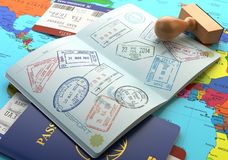The new visa waiver program for Europe’s Schengen Area will be arriving later than expected. The latest announcement from the European Union (EU) has stated that the ETIAS system will now be launched in 2025 instead of 2024. The European Travel Information and Authorisation System (ETIAS) has been in the works for several years. It
Visa Policy for Malta
Malta’s visa policy outlines the requirements for foreign nationals from each state or territory in the world to enter the country.
Different visas and travel authorizations may be required depending on factors such as the traveler’s nationality, the length of time they intend to spend in the Republic of Malta, and the purpose of their trip.
As part of the European Union (EU) and the Schengen Area, Malta shares the Schengen visa policy with regards to nationals of fellow EU and Schengen members and also to short-term visits from third countries.
Schengen and EU citizens enjoy freedom of movement between all member states, including Malta. They may travel to the island country visa-free.
Nationals of various third countries that make up the EU’s visa waiver list are also currently visa-exempt for the whole Schengen Area, including Malta. According to Maltese visa policy, these travelers may stay up to 90 days for certain purposes without a visa.
In 2025, travelers with passports issued by these countries will have to fulfil an additional requirement to continue to enjoy visa exemption for Malta. It will be necessary for such visitors to register their details online with the European Travel Information and Authorization System (ETIAS).
The ETIAS visa waiver for Malta will be quick and easy to obtain. This electronic travel authorization will provide additional security.
Citizens of around 150 countries must apply for a visa for Malta in advance of their trip, regardless of the purpose or length of time they intend to spend in the country. This can be obtained at a Maltese embassy.
Malta does not have a visa on arrival service at this time. There is also no electronic visa (eVisa) for Malta.
Foreign nationals who plan to move to or seek employment in the country must apply for a Malta residence visa and/or Malta work visa at an embassy unless they are EU/Schengen citizens.
Learn more about the different types of visa for Malta below.



